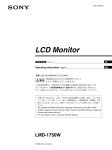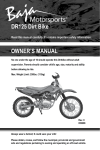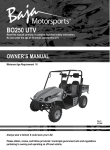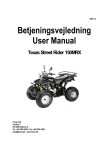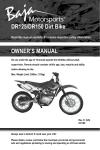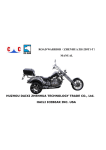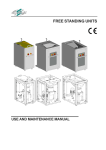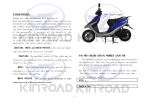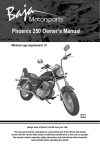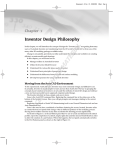Download X250 Dirt Bike OWNER`S MANUAL
Transcript
X250 Dirt Bike Read this manual carefully. It contains important safety information. No on under the age 16 should operate this dirt bike without adult supervision. OWNER’S MANUAL Minimum Age Requirement: 16 Model 250cc REV. C 020509 Always wear a helmet. It could save your life. Do not remove this operator’s manual from this vehicle. Please obtain, review and follow provincial/municipal government acts and regulations pertaining to owning and operating an off-road vehicle. Congratulations on your purchase of the BAJA INC. X250 Dirt Bike. Your bike is warranted to be free of manufacturing defects in the material and workmanship for a period of 90 days from the date of purchase. During the warranty period BAJA, INC. will at its option, repair, provide replacement parts or replace your Baja Motorsports 250cc Dirt bike at no charge. This warranty does not cover normal wear items or damage caused by neglect or misuse of the product. Engine Warranty – 90 days Frame Warranty – 90 days Warranty is void if: Frame is bent or broken due to abuse Wheels are bent or broken Fender bent or broken due to abuse Any sign of impact, accident, jumping, spin-outs or roll over. BAJA, INC. is not liable for any damage claim or liability claim person or otherwise resulting from the operation of this product in any way. Should you experience a problem with your vehicle, please call the Baja INC. customer service line toll free at 1-888-863-2252 between the hours of 7am and 5pm Monday through Friday MST (Mountain Standard Time). MDT (Mountain Daylight Time) during daylight saving time. You will be instructed how to proceed. A COPY OF THE SALES RECEIPT IS REQUIRED. II !! WARNING This manual should be considered a permanent part of the vehicle and should remain with the vehicle when resold or otherwise transferred to a new user or operator. The manual contains important safety information and instructions which should be read carefully before operating the vehicle. ! WARNING The engine exhaust from this product contains chemicals known to the State of California to cause cancer, birth defects or other reproductive harm. CALIFORNIA PROPOSITION 65 III TABLE OF CONTENTS SAFETY ...............................................................................................................2 SAFE OPERATION ......................................................................................3 SAFETY GEAR ............................................................................................4 WARNING LABEL PLACEMENT ................................................................5 SPECIFICATIONS................................................................................................6 PART LOCATION.................................................................................................7 CRANK CASE BREATHER .................................................................................9 OPERATION ........................................................................................................10 FUEL FILLING .............................................................................................10 FUEL VALVE ................................................................................................10 ENGINE BREAK-IN .....................................................................................11 SWITCHES ON RIGHT HANDLE BAR .......................................................11 LEFT HANDLEBAR, CLUTCH LEVER .......................................................12 RIGHT HANDLEBAR, FRONT BRAKE LEVER AND THROTTLE TWIST GRIP.............................................................................12 REAR FOOT BRAKE ...................................................................................12 GEAR SHIFTING .........................................................................................13 PRE-RIDE INSPECTION .............................................................................14 STARTING ENGINE .....................................................................................15 BATTERY INSTALLATION ..................................................................................16 MAINTENANCE ...................................................................................................19 CHECKING ENGINE OIL ............................................................................19 CHANGING ENGINE OIL AND CLEANING SCREEN ................................20 CHECK UP OF SPARK PLUG.....................................................................20 VALVE CLEARANCE...................................................................................21 CHECKING & CLEANING AIR FILTER .......................................................22 ADJUSTING THE THROTTLE CABLE .......................................................23 ADJUSTING THE CARBURETOR ..............................................................23 FRONT HYDRAULIC DISK BRAKE ............................................................24 REAR HYDRAULIC DISK BRAKE ..............................................................24 CLUTCH ADJUSTMENT .............................................................................25 ADJUSTMENT OF CHAIN ...........................................................................26 LUBRICATING CHAIN .................................................................................26 TORQUE SPECIFICATIONS .......................................................................27 INSPECTION AND MAINTENANCE CHART ..............................................28 TROUBLE SHOOTING ........................................................................................30 VEHICLE WASHING ............................................................................................31 INSTRUCTIONS FOR STORAGE .......................................................................32 RESUMPTION OF SERVICE AFTER STORAGE .......................................33 SERIAL NUMBER LOCATION ............................................................................34 EMISSION CONTROL SYSTEM WARRANTY ....................................................35 1 SAFETY Please read this manual and follow all instructions carefully. To emphasize special information, the symbol and the words WARNING or CAUTION have special meaning. Pay attention to WARNINGS and CAUTIONS. WARNING Indicates a potential hazard that could result in death or injury. ! CAUTION Indicates a potential hazard that could result in vehicle damage. NOTE: Indicating special information which makes maintenance easier and/or instructions clearer. WARNING and CAUTION are arranged like this: WARNING-or-CAUTION The first part will identify a POTENTIAL HAZARD. The second part will describe WHAT COULD HAPPEN if you ignore the WARNING or CAUTION. The third part will describe HOW TO AVOID THE HAZARD. This user’s manual contains important safety and maintenance information. Read it carefully before riding. Failing to follow the warnings contained in this manual could result in INJURY or DEATH. It is important that this manual remain with the vehicle when you transfer it to another user or owner. All information, illustrations, photographs and specifications contained in this manual are based on the latest product information available at the time of publication. Due to improvements or other changes, there will be some discrepancies in this manual. We reserve the right to make product changes at any time, without notice and without incurring any obligation to make the same or similar changes to the vehicle previously built or sold. 2 SAFETY SAFE OPERATION Rules for Safe Operation A pre-operation check must be conducted before starting the engine. This check will insure safety, prevent mishaps, and prevent damage to components. It is strongly suggested that all operators take a certified motorcycle rider’s course prior to operating the vehicle. Full attention is required during driving; paying close attention to the following points to avoid any injury to you by other motorized vehicles: · Always wear an approved DOT (Department of Transportation) helmet. It is a proven fact that helmets reduce the number of severe head injuries. Never ride, or let a child ride without a DOT approved motorcycle helmet. · Always wear protective riding gear, helmet, eye protection, long sleeve shirt, long pants, riding boots and gloves. · Always watch for off-road hazards. Be aware of unexpected turns, drop off’s, rocks and other hazards. Keep speed low enough to allow time to react to hazards and changing conditions. · Never use alcohol or drugs before or during operation. Alcohol and drugs can significantly reduce your ability to make good judgements and ride safely. · Do not drive too close to other vehicles. · Never carry a passenger. This dirt bike is for one operator only. · Never operate this dirt bike at night. Night is defined as the period of time 30 minutes before sunset to 30 minutes after sunrise. · Driving at high speeds is the cause of many accidents; do not drive at a speed that the actual situation does not permit. · Never allow anyone under the age of 16 to operate this dirt bike. Physical, mental and emotional maturity are requirements for safe riding. Rider must be able to judge speed, distances and be able to react to changing conditions with good hand, foot and eye coordination. · Always avoid operating an this dirt bike on paved surfaces, including; sidewalks, paths, parking lots, driveways, streets, roads, and highways. Never operated this or any Off Road Vehicle on a public street, road or highway where motor vehicles are in operation. 3 SAFETY · Always keep your dirt bike in safe operating condition. Inspect dirt bike before each ride and perform all recommended maintenance and pre-ride inspections. · Never overload dirt bike. Maximum weight capacity is 250 lbs. (113 kg). SAFETY GEAR A DOT approved motorcycle helmet is the most important part of your safety gear. A DOT approved motorcycle helmet can help prevent a serious head injury. Choose a helmet that fits snug. Motorcycle dealers can help in selecting a good quality helmet which fits properly. ! WARNING Operating this dirt bike without wearing an approved DOT motorcycle helmet, eye protection and protective clothing could be hazardous. Operating without an approved DOT motorcycle helmet or eye protection increases your chances of severe head injury or death in an accident. Operating without protective clothing also increases your chances of severe injury in an accident. Always wear an approved DOT motorcycle helmet which fits properly. Always wear eye protections (goggles or face shield). You should also wear gloves, boots, long sleeve shirt or jacket and long pants. You should wear eye protection when you ride. If a rock or a branch hits your eyes, you could be severely injured. Wear goggles or a face shield. Wear proper clothing when you ride. The proper clothes can protect you from injury. Wear a good pair of gloves, strong boots that are over the ankle, long pants and a long sleeve shirt. Loose clothes are not suitable for motorcycle driving or riding as they may get caught on the operating lever, kick lever, footrest or wheel, resulting in danger. MODIFICATION OF THE VEHICLE ! CAUTION Never perform any unauthorized modifications to this vehicle. Only use original replacement part which can be obtained through Baja Inc. 888-863-2252. 4 WARNING LABEL PLACEMENT OFF ROAD USE ONLY This vehicle is manufactured and designed for off road use only. It does not conform to federal motor vehicle safety standards. Operation on public streets, roads, or highways is illegal 5 SPECIFICATIONS Description Data Description Data Overall Length 1920mm ( 75 1/2 in.) Cylinder bore X Stroke 67mm X 65mm Overall Width 820mm (32 1/4 in.) Compression Ratio 9.2:1 Overall Height 1060mm (41 3/4 in.) Output Max 11.5kw / 6500 RPM 15.2hp / 6500 RPM Wheelbase 1320mm (52 in.) Displacement 244cc Dead weight G.W/N.W 116.5kg/97kg (257 lbs./213 lbs.) Idle Speed 1500 r/min ± 100 r/min Payload 113kg (250 lbs.) Spark Plug A7TC (Torch) D8EA (NGK) Gap .6mm - .7mm (.024” - .028” ) Ground Clearance 250mm (9.84 in.) Front Wheel 70/10-19 22psi Rear wheel 90/100-16 28psi Ignition CDI Max Speed ≤ 90KM/H (56 MPH) Transmission 5 gear mesh Fuel capacity and type 3.35L (.88 gal.) 92 octane or higher 6 PART LOCATION PARTS & SUBASSEMBLIES Clutch Lever Brake fluid reservoir Front brake lever On/Off switch Electric start button Throttle twist grip Fuel tank cap Ignition key switch 7 PART LOCATION Ignition Key Air filter compartment Front Shock Absorber Gas Cap Front Wheel Front brake caliper Battery compartment Rear Shock Fuel Valve Gear Shifting Drive Pedal Side Stand Choke lever Drive Chain on Carburetor Rear Wheel Rear Fork Seat Cushion Exhaust Silencer Front Shocks Rear brake caliper Carburetor Crank case Kick Lever Oil Cap breather Rear Brake pedal 8 CRANKCASE CREATHER When shipped from the factory, the crankcase breather is tied up with a zip tie. Before starting engine for the first time, make sure the zip tie is removed from breather. Remove zip tie using a pair of shears or sharp knife, dispose of zip tie properly. ! CAUTION Zip tie on breather hose needs to be removed before engine is started for the first time. Failure to remove zip tie from crank case breather hose before starting engine the first time could result in damage to engine, breather hose and breather. Starting engine with low or no oil will damage the engine. Crank case breather Breather Remove zip tie 9 OPERATION FUEL FILLING The capacity of the fuel tank is 3.33L (.88 gal) . Unscrew gas cap by turning counter clockwise and carefully fill tank with unleaded gasoline through opening. DO NOT MIX GAS AND OIL TOGETHER, THIS IS A 4-STROKE ENGINE. Replace gas cap by carefully aligning the threads on cap and the tank and turning the cap clock wise. Wipe any spilled fuel from dirt bike using a cloth. Dispose of cloth properly. DO NOT SMOKE OR REFUEL VEHICLE NEAR OPEN FLAMES OR NEAR HEATING UNITS. ONLY REFUEL THE VEHICLE IN OPEN AREAS TO REDUCE THE LIKELIHOOD OF THE BUILD UP OF GASOLINE FUMES. FUEL VALVE ON: Turn fuel valve to ON” position before attempting to start engine. Turning fuel valve to “ON” position allows fuel to flow to the carburetor.. OFF: Turning fuel valve to “OFF” position, prevents the flow of fuel from fuel tank to carburetor Fuel Valve 10 OPERATION ENGINE BREAK-IN The first 10 hours of operation should be considered the “Break-in” period and special attention shall be paid to the following points: 1. Do not throttle past half throttle during the first 10 hours of operation. Fluctuate the throttle during this period to break in engine components. Do not put excessive load on engine by climbing steep hills or having fast starts. 2. Warm up engine 3-5 minutes prior to operation so all components are lubricated sufficiently. Failure to allow engine to warm up could cause damage to engine. SWITCHES ON RIGHT HANDLEBAR Ignition switch The ignition switch is Located on the right handlebar. When switch is turned to “ ” (off) position, the engine will not start. If engine is running and (off) button is pushed the engine will turn off. When switch is turned to “ ” (on) position, the engine can start when ignition key is also at (on) position and electric start button is depressed, or when starting by the kick lever. OFF button ON button Electric Start button 11 OPERATION LEFT HANDLEBAR, CLUTCH LEVER Clutch lever Clutch lever When clutch lever is pulled toward hand grip, clutch is applied. RIGHT HANDLEBAR, FRONT BRAKE LEVER AND THROTTLE TWIST GRIP Front brake lever Throttle twist grip Throttle twist grip Controls engine and dirt bike speed. When twist grip is turned back CCW (counter clockwise) engine speed is increased along with speed of dirt bike. When twist grip is turned forward CW (clockwise) engine speed is decreased along with speed of dirt bike. Front brake lever Squeeze lever toward hand grip to apply front brakes. REAR FOOT BRAKE The foot brake is located on right hand side of dirt bike. Foot brake applies rear brake Rear foot brake 12 OPERATION GEAR SHIFTING Reduce throttle before shifting. Never increase throttle while shifting gears. Pull in the clutch lever, located on the right hand grip Depress the Shift lever to place the gear in 1st, lift up the lever to shift to 2nd, 3rd, 4th and 5th. Do not place your foot on the gear-shifting pedal while operating the dirt bike to avoid damaging the clutch caused by sudden accidental gear shift. 4 3 2 5th gear 4th gear 3rd gear 2nd gear Neutral 1st gear 1 N (5) (4) (3) (2) (N) (1) 5 Shifting to lower gears Shifting sequence Shift lever Shifting to higher gears Points for Attention during Drive 1. Avoid unnecessary idling of engine at high speeds. Idling engine at high speeds will damage engine components. 2. The clutch will wear out quickly if clutch in a semi-engaged position. Clutch should be pulled in and release once desired gear is achieved, do not hold clutch half in or half out of engagement. 3. Shift to lower gears when there is insufficient power to climb hills or continue forward. 4. Use both front and rear brakes when coming to a stop. Applying front brake only could cause front wheel to lock up which could result in an accident. 5. Do not place transmission in neutral while traveling at high speeds 6. Decrease throttle while braking. 13 OPERATION PRE- RIDE INSPECTION Before each ride it is important to inspect your dirt bike. Make sure any problems found are corrected before starting engine. A pre-ride inspection is a must for off-road riding because off road riding can provide excessive wear and tear on components. Tires: Use a tire gauge to check the air pressure Adjust air pressure if needed. Look for signs of damage or excessive wear. Spokes and Rims: Make sure all spokes are tight, check rims for damage. Leaks: Look under vehicle for signs of leaking fluids (Oil or Gas) Engine Oil: Check engine oil level, add oil if needed. Nuts and Bolts: Check nuts and bolts for tightness. Refer to proper Torque specifications located on page 25. Throttle: Check throttle free play and adjust if needed. Rotate throttle to make sure it moves smoothly without sticking, and snaps back automatically when released, in all steering positions. Brakes: Squeeze front brake lever and step on the rear brake pedal to check that the controls operate normally. Adjust free play, if necessary. Fuel: Check fuel level and add fuel if needed. Make sure fuel fill cap is securely fastened. Cables: Check cable housing for wear. Check fittings for looseness. Replace or tighten as needed. Maintenance: Make sure maintenance procedures are followed in this manual. 14 OPERATION ! WARNING Never start engine without first performing a pre-ride inspection Failure to perform a pre-ride inspection could result in severe injury or death. Always perform pre-ride inspection before every ride and correct any problems. ! CAUTION Verify oil level prior to starting. Starting the engine with low or no oil will damage the engine. ! WARNING Never start the engine in a closed place as the exhausted fumes from vehicle contains toxic carbon monoxide. Closed STARTING ENGINE 1. Set the ignition key switch to “ON” position. 2. Set the handlebar ON/OFF switch to “ON” position. 3. Put dirt bike in neutral gear. 4. Ensure that there is fuel in tank. Open 5. Set the fuel valve lever to “ON” position. 6. If engine is cold, place choke lever in up (closed) position. choke lever 7. Start engine with electric start or kick start lever. 8. Once engine has started, slightly turn throttle twist to increase rpm’s to warm engine. Do not fully open throttle to warm engine. 9. Once engine has sufficiently warmed up, place choke lever in down (open) position. ! CAUTION The engine can only be started in neutral gear. Unnecessarily increasing RPM’s to a high level while the dirt bike is in neutral is harmful to engine. Procedures for stopping the engine: 1. Release throttle twist grip to slow down engine. 2. Shift to neutral position. 3. Set ignition switch to “ ” (OFF) position. 4. Set fuel valve handle to “OFF” position. 15 BATTERY INSTALLATION BATTERY INSTALLATION INITIAL SERVICE AND INSTALLATION OF BATTERY: WARNING The following procedure is very dangerous and should be performed with utmost care and attention. Wear protective eye wear, rubber gloves, and have water available should electrolyte come in contact with skin or eyes. KEEP ALL CHILDREN AWAY FROM THE AREA WHILE THIS PROCEDURE IS BEING PERFORMED. POISON – CAUSES SEVERE BURNS Contains sulfuric acid. Avoid contact with skin, eyes, or clothing To prevent accidents, rinse empty container with water. ANTIDOTE: External – flush with water Internal – Call physician immediately. Drink large quantities of water or milk. Follow with milk of magnesia, beaten eggs or vegetable. Eyes – Flush with water for 15 minutes and get prompt medical attention. KEEP OUT OF REACH OF CHILDREN. 16 BATTERY INSTALLATION Note: The following page is for vehicles with battery’s containing separate electrolyte pack. Preparing the battery: · Place battery on level surface. Remove cap strip from top of battery. (see figure 20) Figure 20 . Wear eye protection and rubber gloves for this step. Once battery strip is removed, locate electrolyte in bottle and place over the six openings. Press firmly down on bottle allowing the battery to pierce the six in-line openings in bottle. Let electrolyte drain into battery until bottle is completely empty. (see figure 21) · Discard empty electrolyte container in a waste area that is inaccessible to children and animals. · After filling let battery stand for at least 30 minutes before charging. This allows the electrolyte to penetrate plates for optimum performance and ensures longer battery life. · After 30 minutes the battery is ready for its initial charge. Place caps loosely over battery cell holes (see figure 22) 17 Figure 21 Figure 22 BATTERY INSTALLATION How to Initially Charge the battery: 1. Connect the red positive (+) cable to the red positive (+) pole of the battery. (see figure 24) 2. Connect the black negative (-) cable to the black negative (-) pole of the battery. (see figure 25) Note: The red positive (+) cable has a larger diameter than the black negative y cable. 3. Figure 24 Charging rate: Charge battery @ 0.7 Amps for 5 ~ 10 hours. • After charging is complete, install securely all six battery caps (see figure 26) • Install battery into battery tray located under seat (see figure 27). • Once battery is firmly seated in tray, attach red positive (+) wire to positive (+) terminal on battery, then attach black negative (-) wire to negative (-) terminal on battery (see figure 27) Battery Compartment Bolts Figure 25 Figure 26 Red + WARNING Black - NEVER REMOVE THE STRIP OF CAPS NOR ADD ANY WATER OR ELECTROLYTE. Figure 27 18 MAINTENANCE CHECKING THE OIL Check engine oil each time prior to operating dirt bike. The oil level should be between the upper and lower lines of oil gauge fitted in a screw plug, which is on right cover of crankcase. 1. Set dirt bike on level ground. Look at sight gauge for current oil level. You can also remove dipstick plug, wipe it clean and then reinsert into crankcase. Remove dipstick to check oil level. 2. Add lubricating oil up to the upper line when needed, but do not overfill. 3. Finally reinstall dip stick plug and cinch finger tight. ! CAUTION Never start engine when there is insufficient lubricating oil. Otherwise, it will cause harm to engine. Oil dip stick plug Oil sight gauge Lubricating Oil Recommended The lubricating oil is an important factor affecting performance and service life of engine. Please refer to the chart for correct grade of engine oil based on the environmental conditions in your area. Do not use any other type of oil other than what is recommended in the chart. DO NOT MIX OIL WITH THE GASOLINE. Lubricating oils of different viscosity should be employed in different regions and at different temperatures. 20W-50 5W-40 15W-40 MACHINE OIL 10W-40 10W-50 10W-30 °C -30 -20 -10 0 10 20 30 40 °F -22 -4 14 32 50 68 86 104 TEMP. 19 MAINTENANCE CHANGING ENGINE OIL AND CLEANING SCREEN 1. Remove oil drain Plug, located at bottom of engine and let oil drain into an approved collection container. DO NOT PERFORM THIS PROCEDURE WHILE ENGINE IS HOT. SERIOUS BURNS COULD RESULT FROM CONTACT WITH HOT OIL. 2. Dispose of the used oil properly. For proper disposal procedures, contact your local oil recycling center. 3. Remove oil filter plug and screen, Clean oil filter screen with solvent. 4. Re-install oil Plug. 5. Re-install oil filter screen and screen plug 4. Refill engine with proper amount of oil and recheck amount of oil by using dip stick and/or sight gauge. Oil filter screen Spring Oil Plug Screen Plug CHECK-UP OF SPARK PLUG 1. Remove the cap of spark plug and screw off the spark plug using the plug wrench. 2. Clean the spark plug all around or replace it if it is corroded or there is too much deposit on it. 3. Regulate the gap of the spark plug to 0.60.8mm. .024” - .032” 3. The spark plug of the designated type should be used. The applicable type of spark plug: D8EA (NGK) 20 0.6~0.8mm (.024” - .032”) MAINTENANCE VALVE INSPECTION REFER TO MAINTENANCE SCHEDULE IN THIS OWNER’S MANUAL FOR VALVE ADJUSTMENT INSPECTION INTERVALS. Valve clearance should be: Intake: 0.002 inch (0.051 mm) Exhaust: 0.002 inch (0.051 mm) The engine will make excess noise if the gap is too large in air valve. If gap is too small valve operation will be hindered which could result in valve malfunction and failure. Therefore, air valve gap must be checked periodically. If you have the proper tools and are mechanically proficient, instructions on adjusting the valve clearance are given in the service manual. If assistance is needed please contact Baja Inc to find your local service center. 21 MAINTENANCE CHECKING & CLEANING THE AIR FILTER 1. Air filter is located under seat. To get to the air filter remove bolts from each side of seat. Remove air filter cover 2. Take the air filter out and check to see if it is dirty or torn. 3. Remove foam element and wash with water and allow to dry per instructions below. 4. Apply a few drops of machine oil. Squeeze it with a dry cloth to remove excess oil. Recommended oil: SAE 15W-40 5. Re-install air filter making sure it is seated correctly. Bolts (each side) Air Filter cover Air filter Air filter Wash foam element with water Squeeze out excess water ! CAUTION The air filter element must be intact or the engine will suck in dust and dirt, resulting in a shorter service life of the engine. Water should be prevented from entering into the filter when washing the vehicle. The filter element shall be cleaned gently without twisting to prevent it from cracking. Never wash it with gasoline or any acid, alkaline or organic volatile oil to avoid its aging, which will result in reducing the effect of the air filter oil to catch particles before they enter the engine. Replace the filter element with a new one if it is broken or cracked. 22 MAINTENANCE ADJUSTING THE THROTTLE CABLE 2-4mm 1/16 - 3/16 in Make sure the throttle works normally. Check if the throttle twist grip has the required free operating movement. The required free operating movement: 2-4mm (1/16-3/16 in) If the grip cannot be moved freely, turn adjusting nut located on top of the throttle twist grip to ensure proper operating movement. Adjust nut After adjustment, start the engine and check for the operating movement again. Repeat the adjustment if necessary until the desired operating movement is obtained. ADJUSTING THE CARBURETOR Adjusting procedures of idling speed: 1. Support the vehicle by a stand. 2. Adjust the idling speed by the throttle stop screw to 1700 rpm ± 100 rpm. ! CAUTION Do not try to correct a malfunctioning carburetor by adjusting the idling speed. If the carburetor is not functioning properly, it should be repaired by a service center. Adjust idling speed only when the engine is warmed up or 10 minutes after operation. Idle speed adjusting screw 23 MAINTENANCE FRONT HYDRAULIC DISK BRAKE INSPECTION Brake fluid reservoir Lower mark Brake hose Brake fluid cap Front disk brake caliper Brake fluid level 1. Inspect the front disk brake caliper for leakage. If brake fluid leaks, the safety of riding could be affected. 2. Inspect the brake hose for cracks, and the joint for leakage. 3. Check the brake fluid level in the brake fluid reservoir, if level is at or below the LOWER mark, inspect brake pads for wear and hydraulic system for leaks. 4. To add brake fluid, unscrew the 2 screws on top of the brake fluid container. Add DOT3 or DOT4 brake fluid. Do not mix brake fluid types. REAR HYDRAULIC DISK BRAKE INSPECTION Brake fluid cap Rear disk brake caliper Brake hose Brake fluid reservoir Sight gauge 1. Inspect the rear disk brake caliper for leakage. If brake fluid leaks, the safety of riding could be affected. 2. Inspect the brake hose for cracks, and the joint for leakage. 3. Check the brake fluid level in the brake fluid reservoir, if level is at or below the middle of sight window inspect brake pads for wear and hydraulic system for leaks. 4. To add brake fluid, unscrew cap on top of brake fluid container. Add DOT3 or DOT4 brake fluid. Do not mix brake fluid types. 24 MAINTENANCE CLUTCH ADJUSTMENT 3.0 - 5.0mm play (0.12”-0.20”) Clutch lever adjustment nut Adjustment Cover To adjust the clutch lever play: 1. Remove adjuster cover (slide back on cable). 2. Loosen adjuster nut and move adjuster in or out to obtain the correct play. 3. Tighten adjuster nut 4. Recheck the clutch lever free distance. Readjust it if it is not within the correct limits. To adjust the clutch: 1. Loosen adjuster nut and move adjuster in or out to obtain the correct tension. 3. Tighten adjuster nut 4. Recheck the clutch lever free distance. Readjust it if it is not within the correct limits. Clutch adjustment 25 MAINTENANCE ADJUSTMENT OF CHAIN 1. When chain adjustment is needed, loosen rear axle bolt . 2. Turn the chain adjusting nuts on the left and right sides to adjust the tension of the chain and to align the marking of the chain adjuster with the engraved lines in the similar position on both sides. 3. Tighten rear axle bolt by a torque of 50-60Nm (37-44 ft.lb.). 4. Repetitively check the tension of the chain. Rear axle bolt 15-20mm 1/2” - 3/4” Chain adjusting nuts LUBRICATING CHAIN 1. Shut off the engine 2. Add light amounts of machine oil or chain lube to the driving chain. (Too much machine oil or chain lube may cause splattering to occur.) Attention: The chain should be replaced when the adjusting limit has reached it’s maximum. 26 MAINTENANCE TORQUE SPECIFICATIONS 1 Front wheel axle bolt 12mm 35-45 Nm (26-33 ft.lb.) 2 Rear wheel axle bolt 13mm 50-60 Nm (37-44 ft.lb.) 3 Handle bar clamp bracket 4 ea. 8mm 20-25 Nm (15-18 ft. lb.) 4 Top triple tree shock bracket 2 ea. 6mm 8-11 Nm (6-8 ft. lb) 5 Bottom triple tree shock bracket 2 ea. 8mm 20-25 Nm (15-18 ft. lb) 6 Engine mounting bolts front 2ea. 8mm 20-25 Nm (15-18 ft. lb) 7 Engine mounting bolts rear 2 ea. 10mm 32-34 Nm (24-25 ft. lb) 8 Rear shock mount bolts 2 ea. 10mm 32-34 Nm (24-25 ft. lb) 9 Seat mount bolts 2 ea. 8mm 20-25 Nm (15-18 ft. lb) 10 Foot brake lever main bolt 8mm 20-25 Nm (15-18 ft. lb) 11 Foot brake lever end bolts 2 ea. 6mm 8-11 Nm (6-8 ft. lb) 12 Swing arm Bolt 12mm 35-45 Nm (26-33 ft.lb.) 13 Main triple tree mounting bolt 35-45 Nm (26-33 ft.lb.) 13 3 4 9 5 8 1 6 2 12 10 11 7 27 MAINTENANCE INSPECTION AND MAINTENANCE It is very important to inspect and maintain your dirt bike regularly. Follow the guidelines in the chart. The intervals between period service in months are shown. At the end of each interval be sure to perform the maintenance listed. MAINTENANCE SCHEDULE Item Initial 1 months * Valves Initial 3 Months Every 3 Months Every 6 Months I I Valve clearance/ Adjust I Spark Plug C Air Filter C R I Every 20 - 40 hours (more often in dusty areas) * Carburetor I I * Exhaust system I Spark arrester I Fuel hose I I Engine Oil R R Engine Oil filter C C Engine Oil strainer C C Brake Fluid level I Brake Hose and joints I I I I Brakes I I I Clutch I I I Wheels I I Wheel bearings I I Brake caliper linings I I I Front and rear suspension I Steering system I I I * Steering shaft lubrication (use Li grease) L Fittings and Fasteners T T * Should be completed by an authorized service center I=Inspect and clean, adjust, lubricate or replace, if necessary. C=Clean R=Replace T=Tighten 28 T TROUBLESHOOTING This troubleshooting guide is provided to help you to find the cause of some common complaints. COMPLAINT: Engine is hard to start or does not start at all. Something is probably wrong with the fuel system or ignition system. ! CAUTION Failing to troubleshoot a problem correctly would damage your Dirt Bike. Improper repairs or adjustments may damage the vehicle. Such damage may not be covered under warranty. If you are not sure about the proper action, consult your authorized service center or Baja Inc. about the problem. Fuel Supply Check 1. Make sure there is adequate fuel in the fuel tank. 2. Check that the engine stop switch is in the “RUN “ position. 3. Check that the fuel valve is in the “ON” position. 4. Make sure there is enough fuel reaching the carburetor from the fuel tank. WARNING Draining fuel from the carburetor could be hazardous. Fuel could catch fire if you do not handle it properly. When draining the carburetor, be sure to shut the engine off. Do not smoke, and never drain or refuel in an area where there are open flames or sparks. Do not spill the fuel or you may create a fire hazard. Dispose of drained fuel properly. a. Loosen the drain screw which is located under the carburetor. Drain the fuel from the carburetor into a container. b. Tighten the drain screw. c. Run the engine for a few seconds. Shut off engine. d. Loosen the drain screw and check that the carburetor is filled back up with fuel. e. If fuel is reaching the carburetor, the ignition system should be checked next. 29 TROUBLESHOOTING Ignition System Check 1. Remove the spark plug and reattach it to the spark plug lead. 2. Turn ignition key to the “RUN” position. Slide the engine stop switch to the “Run” position. Push the electric button “START “(grey button). If the ignition system is operating properly, a blue spark should jump across the spark plug gap. If there is no spark, take your machine to your service center. WARNING Performing the spark test improperly could be hazardous. You could get a high voltage electrical shock if you are not familiar with this procedure. Do not perform this check if you are not familiar with the procedure. Do not point the spark plug near the spark plug hole during this test. Do not do this test if you have a heart condition or wear a pacemaker. Do not perform this test is any near any open fuel containers for near fuel which has spilled on the ground, on the engine, or any part of the dirt bike. COMPLAINT: Engine stalls 1. Make sure there is enough fuel in the fuel tank. 2. Check to see that the spark plug is not fouled. Remove the spark plug and clean it. Replace it, if necessary. 3. Make sure the fuel valve is not clogged, and the fuel tank is not clogged, either. 4. Check the idle speed. If necessary, adjust it using a tachometer. The correct idle speed is 1400~1600 r/min. 5. Make sure the air filter is clean. 30 VEHICLE WASHING Cleaning the vehicle regularly can slow down the color fading of its body and make it easier to check if there is any damage and any oil leakage. ! CAUTION Washing the motorcycle with over-pressurized water may cause damage to some of its components. Therefore, do use a pressure washer to clean the vehicle. The following parts should be cleaned using low pressure water: — Wheel hub — Exhaust pipe — Fuel tank and lower portion of cushion — Carburetor — Head lock and ignition switch — Air filter 1. After pre-wiping, the vehicle should be washed with clean water to remove dirty residues so as to prevent corrosion. Plastic subassemblies should be cleaned by wiping with a cloth or foam soaked in neutral detergent solution, followed by washing with clean water. 2. After the cleaned vehicle is air dried, grease the chain and run the engine at idling speed for a few minutes. 3. Prior to driving, carefully check the braking system repeatedly and repair or adjust it if necessary. 31 INSTRUCTIONS FOR STORAGE If the vehicle is not going to be used for a long period of time, for example, in winter time, some steps should be taken to prevent malfunction of and damage to its components which might be caused by long storage. Before storing the vehicle for a long period , proper maintenance has to be carried in case maintenance is not completed when the vehicle is put back into use after storage. 1. Change engine oil and clean oil filter. 2. Drain off fuel from the fuel tank and carburetor, spray atomized anti-rust oil onto the inside wall of the tank and then close the tank. Dispose of any drained fuel properly so as not to adversely affect the environment. Carburetor Drain screw Attention: If the storage will last for more than one month, fuel in the carburetor must be fully drained. This will help ensure that the carburetor maintains its normal performance after the storage. WARNING Gasoline is flammable and may cause fire and even an explosion under certain conditions. Therefore, do not smoke, make a fire or have any fire around while draining off fuel. 3. Take out the spark plug, pour about 15-20ml (.5 - .68 oz.) of clean engine oil into the cylinder, step down on the kick lever repetitively several times so as to have machine oil distributed all over the engine and finally fit the spark plug back on. Attention: The ignition switch must be set to “ ” (OFF) position before stepping down on the kick lever. To protect the ignition system from damage, the spark plug should be inserted in its cap and grounded. 4. Wash the vehicle clean, wipe it dry and apply an even coat of wax to the painted surface and a coat of anti-rust oil on the chrome-plated surfaces. 5. Inflate the tires as required and put the vehicle up on wooden blocks with the two wheels clearing the ground. 6. Put the vehicle in a shady and cool place free from humidity and direct sunlight and cover it properly (not with plastic or other painted materials). If there is a garage, store it within. 32 INSTRUCTIONS FOR STORAGE RESUMPTION OF SERVICE AFTER STORAGE 1. Change engine oil if vehicle has been out service for over 4 months. 2. Drain off any remaining unused gas in tank, follow by filling with fresh gasoline. 3. Make sure all bolts are tight. See torque specs. 4. Prior to riding, all the required check-ups must be made. Ride at a low speed in an open area to test performance before normal operation . 33 SERIAL NUMBER LOCATION SERIAL NUMBER LOCATION You need to know the frame and engine serial numbers to get title documents for your Dirt Bike. You also need these numbers to help your authorized service center or Baja Inc. order parts. The Frame number is stamped on front of Dirt bike frame. The engine number is located on the left side of the engine housing. Frame number Engine serial number Write down the serial numbers here for your future reference Frame No.: Engine No.: 34 EMISSION CONTROL SYSTEM WARRANTY BAJA MOTORSPORTS – EMISSION CONTROL SYSTEM WARRANTY YOUR WARRANTY RIGHTS AND OBLIGATIONS The emission control system warranty period for this vehicle begins on the date the vehicle is delivered to the first purchaser other than an authorized dealer, or the date it is first used as a demonstrator, lease, or company vehicle, whichever comes first and continues for 60 months after that date, or 5,000km, whichever comes first, provided there has been no abuse, neglect or improper maintenance of your vehicle. Where a warrantable condition exists, the Distributor will repair your vehicle at no cost to you, including diagnosis, parts and labor. If an emission-related part on your vehicle is defective, the part will be repaired or replaced by the Distributor. This is your emission control defects warranty. OWNER’S WARRANTY RESPONSIBILITIES As the vehicle owner, you are responsible for the performance of the required maintenance. You should maintain a record of all maintenance performed on your vehicle and retain all receipts covering maintenance on your vehicle. You may not be denied a warranty claim solely because of your failure to ensure the performance of all scheduled maintenance or lack of maintenance records or receipts. You are responsible for presenting your vehicle to an authorized dealer as soon as a problem exists. The warranty repairs should be completed in a reasonable amount of time, not to exceed 30 days. As the vehicle owner, you should be aware that you may be denied your warranty coverage if your vehicle or a part has failed due to abuse, neglect, improper maintenance, or unapproved modifications. WARRANTY COVERAGE The Distributor warrants that each new 2009 and later vehicle: • is designed, built, and equipped so as to conform at the time of initial retail purchase with all applicable regulations of the United States Environmental Protection Agency, and the California Air Resources Board; and • is free from defects in material and workmanship which cause such vehicle to fail to confirm with applicable regulations of the United States Environmental Protection Agency or the California Air Resources Board for the periods specified above. Your emission control system warranty covers components whose failure would increase an engine’s emission, including electronic controls, fuel injection system, carburetor, the ignition system, catalytic converter, or any other system utilized in this vehicle to control emission if it is originally equipped. Also included may be hoses, connectors and other emission-related assemblies. Replacing or repairing other components (including parts, labor, and other costs) not covered by this emission control system warranty or the standard warranty is the responsibility of the owner. 35 EMISSION CONTROL SYSTEM WARRANTY Coverage of repairs under this warranty applies only when repairs are completed at an authorized dealer or repair facility. The Distributor will not cover repairs performed outside of an authorized dealer or repair facility. The use of replacement parts not equivalent to the original parts may impair the effectiveness of your vehicle’s emission control system. If such a replacement part is used and an authorized dealer determines it is defective or causes a failure of a warranted part, your claim for repair to bring your vehicle into compliance with applicable standards may be denied. This Emission Control System Warranty is in addition to the standard Limited Warranty. EXCLUSIONS AND LIMITATIONS This warranty does not cover the following: • Failures or malfunctions of the emission control systems caused by abuse, alteration, accident, misuse, the use of leaded gasoline. • Replacement of expendable maintenance items unless they are original equipment defective in material or workmanship under normal use, and the first required replacement interval for the item has not been reached. Expendable maintenance items include but not limited to spark plugs, filters, coolant, lubricants, gaskets, hoses, and belts. • Replacements of parts and other services and adjustments for required maintenance. • Any vehicle equipped with an odometer or hour meter where the reading is altered so that actual mileage cannot be readily determined. • Repairs or replacements as a result of: o Accident o Misuse o Use of replacement parts or accessories not conforming to the original specifications which adversely affect performance • Physical damage, corrosion, or defects caused by fire, explosions or similar causes beyond the control of the Distributor. • Failures not caused by a defect in material or workmanship. Use of the vehicle in any type of competitive racing or related events immediately and completely voids this and all other warranties. LIMITED LIABILITY The liability of the Distributor under this Emission Control System Warranty is limited solely to the remedying of defects in material workmanship by an authorized dealer at its place of business during customary business hours. This warranty does not cover inconvenience or loss of use of the vehicle or transportation of the vehicle to/from the authorized dealer. The Distributor is not liable to any person for incidental, consequential or special damages of any description, whether arising out of express or implied warranty or any other contract, negligence or other tort or otherwise. 36 EMISSION CONTROL SYSTEM WARRANTY No express emission control system warranty is given by the Distributor except as specifically set forth herein. Any emission control system warranty implied by law, including any warranty of merchantability or fitness for a particular purpose is limited to the express emission control system warranty terms stated in this warranty. The foregoing statements of warranty are exclusive and in lieu of all other remedies. All express warranties not stated in this warranty are disclaimed. Some states do not allow limitations on how long an implied warranty lasts, so the above limitations may not apply if it is inconsistent with the controlling state law. No dealer is authorized to modify this Emission Control System Warranty. If you have any questions regarding your warranty rights and responsibilities, you should contact BAJA INC. at 888-863-2252 37 Baja, INC. P.O. Box 61150 Phoenix, AZ 85082 Tel: 602-443-9180 Toll Free: 888-863-2252 36









































